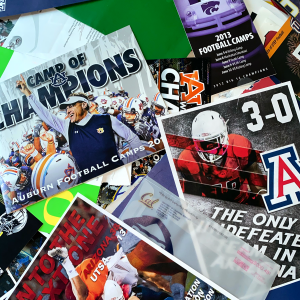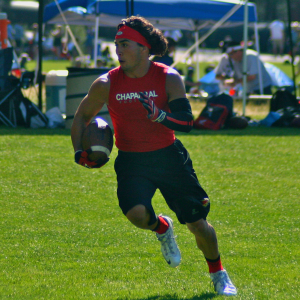By Rob Kliefield
Cronkite News
TEMPE – New technology aims to bridge the gap between social media and the college football recruitment process. Now, more than ever, players across America have easy access to a pathway that may amplify the odds of reaching the next level.
Just ask former Chaparral and Sunrise Mountain high school standout Elijah Castro, and he’ll confirm that the foremost facet of being recruited isn’t catching passes, it’s snatching eyeballs.
“There’s so much more to football than just going out there on Friday nights and playing,” said Castro, who lived in Peoria his first three years of high school before moving to Scottsdale to join the Firebirds. “The biggest thing is just getting seen, being in front of coaches.”
The current recruiting landscape is saturated with groups and services like Next College Student Athlete, BeRecruited and CaptainU, which convince players and parents they need their aid to get on colleges’ radars.
These helping-hands vary in terms of efficiency, cost and provided features. Some charge families upwards of $1,000 to enter a player’s name into an invisible directory, supposedly outlining prospects for schools in nearby regions. Often, players are congratulated, not for receiving scholarships, but for being added to a school’s recruiting board. There is no exact science, however, that proves the foregoing feat even occurs, and most parents aren’t informed enough to know otherwise.
Enter Signing Day Sports, a tool the company infers could transform players’ and parents’ struggles into saved money, time and optimism – a tool that, realistically, could have significantly altered and extended Castro’s once-promising career on the field.
“I believed in myself,” Castro said. “I believed in the talent I could have provided for any school … but getting in front of the coaches was the hardest thing.”
Castro compiled 4,829 all-purpose yards over his final two seasons of high school football. He crossed the pylon 46 times in that same two-year span. As a senior, Castro was arguably the most dynamic offensive player on a team that advanced to the 2013 Division II Arizona state championship. He threatened to score each time he touched the football, yet he graduated the following spring with zero major college scholarship offers.
“We had a lot of kids who at least wanted to try and make their dreams come true,” Castro said. “The situation I was in was just tough.”
He said his recruitment spiked playing alongside Arizona and Arizona State commits Trevor Wood and Tyler Whiley, as well as a collection of other highly touted underclassmen. Castro called his transfer to Chaparral a privilege that most kids aren’t afforded. But to his disappointment, opportunities regarding his future in a football uniform remained scarce.
The grim reality? Castro endured the same hardships that hundreds of thousands of high school football players across the country encounter each year. The NCAA estimates just 7.3 percent of participating high school football players will compete at the Division I, II or III levels.
That’s approximately 73,750 from a pool of more than one million.
His most obvious flaws? Castro was considerably shorter than his future Division I teammates. He lacked the fifth gear that makes Power Five coaches drool. But, most of all, he wasn’t afforded the exposure that his game warranted because, at the end of the day, coaches – both at the high school and college ranks – must pick and choose which players and prospects bank their time, energy and resources.
“One coach can have over 100 kids on a roster that he’s trying to help get to the college level, and it’s hard, it’s stressful, because after your senior year that coach has to get ready for the following (class),” Castro said. “People don’t realize that head coaches go through a lot. People get mad like ‘why can’t I get this or this, or that?’”
It didn’t necessarily matter that Castro possessed a rare determination, that he was a workout junkie and a respectful student. Standing 5-feet-7 he was largely left behind, despite repeatedly, stealing the spotlight on Friday nights.
“There were a lot of great players on both sides of the football that were getting big-time looks,” said Castro, discussing the perks and drawbacks of starring as an undersized slot receiver on a stacked roster. “I was doing everything I possibly could on the field, and everything in the classroom as well. Everything happens for a reason, though.”
Now, Castro has flipped the script and assists high school athletes in their quest to further their football careers as a lead recruiter for Signing Day Sports, which is a platform designed to revolutionize the evaluation process for players and coaches.
“That’s really why I built this thing – to give back and to help the kids get to the next level,” said Dennis Gile, a nationally renowned private quarterback instructor, based out of Arizona, and founder of Signing Day Sports. “To be able to have someone like Elijah, who can come in here and help us and be a salesman for us, he understands it, he gets it, he lived it.”
“At the very beginning it was just football, but then we saw the power of it,” Rasmussen said. “It’s scalable. We could take it over to other sports easily, now that we’ve got the platform built.”
And, that’s the vision currently intact. People are hustling on the back end to, hopefully, launch a new sport every 60 to 90 days. Baseball is next, then basketball, followed by soccer and softball. Eventually, the goal is to incorporate the world’s 10 biggest sports, so that everyone can thrive under similar circumstances.
The last three years for Signing Day Sports has been a conglomerate journey full of back-tracking, testing and planning. Now, satisfied with its functionality, the company will soon launch an extensive marketing and advertising campaign that will “drop a bomb on some people pretty fast,” Gile said.
Castro’s confidence he would have been a huge beneficiary of Signing Day Sports if it existed years ago, fills the air – it is evident he’s given this hypothetical scenario some thought.
“Every time we talk about that, ‘what if I had this my senior year? What could have happened?’” Castro said, “I kind of get angry with myself because I’m like ‘man, what if Signing Day Sports was there? I honestly don’t think I’d be here right now. … I would have had 25 to 30 offers.”
The scholarships never poured in, though.
So channeling his warrior mentality, Castro continued training, hopeful that some school may present an opportunity to perform between the white lines at a later date. But while preparing for a visit to Boise State in 2015, he snapped his leg in three separate places.
“He could have had his pick of the litter and been able to go where he wanted and got to play, and who knows what would have happened at that point,” Gile said. “I think you have hundreds of thousands of kids in the United States that are like (Elijah), and I’m not just saying that because we want someone to sign up here, so that we make money. I think this truly equals the playing field for every single person in the country…It gives everyone a fair shot to go to the next level.”
Castro plotted his comeback almost a year later, eyeing a walk-on shot at Arizona State, then tore another ligament in his previously reconstructed right leg, effectively marking the end of a carefully crafted, childhood dream.
“When hard times come you just have to keep pushing through, and believing in yourself,” Castro said. “It builds character…it literally built who I am, today.”
Unbeknownst to Castro then, it additionally marked the beginning of a greater purpose: helping rising football players succeed in accomplishing their dreams.
“I don’t care what time it is, (they) can ask me questions, call me or whatever. I’m here to help,” said Castro, not surprised at all by the continuous flow of curiosity and absorption on a daily basis. “We’re getting great feedback from all these players because it’s something they’ve never seen before.”
Naturally, of course, the players’ database within the Signing Day Sports app will drive the coaches’ database. And, vice versa. Interest breeds influence in this setting.
“The more and more kids that get on it, guess where the coaches are going?” said Sanders, expressing his team would have implemented the app in a heartbeat. “That’s just the name of the game.”
For more stories from Cronkite News, visit cronkitenews.azpbs.org.


